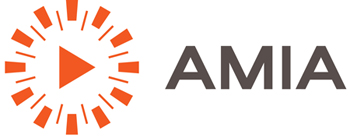AMIA 2014 Call for Proposals
The AMIA Conference Committee invites submissions for proposals for the 2014 Annual Conference in Savannah, Georgia. The Conference Committee encourages papers, panels and posters on all issues to do with audiovisual archives with particular emphasis in the areas of problem solving, technical issues and the digital archive.
This year, the conference will include three curated streams of program in addition to proposals received. Each curated stream will include five sessions during the conference. If your proposal is focused on one of these streams, we encourage you to contact the curation team for that stream to avoid duplicate effort.
- The open source digital preservation and access stream will comprehensively address the use of open source software that is in current significant use within digital preservation and access systems. Curated in collaboration with AMIA’s Open Source Committee the stream will also cover larger issues such as when it does or does not make sense to take the open source approach, and how to navigate the complexities of copyright and licensing. Contact: osdigstream@amiaconference.com
- Film in Transition. As the portfolio of available film stocks continues to decline and film labs continue to close worldwide, this stream will discuss the concrete implications this evolution of the industry has for archives and long-term content managers. Contact: evolstream@amiaconference.com
- Global Exchange. Will bring together voices from regions from around the world to share solutions and exchange ideas. Curated by AMIA’s International Outreach Committee, the emphasis will be on exchange, innovation, and learning from colleagues near and far. Contact: iocstream@amiaconference.com
The goal of the Conference is to present a program that includes a wide variety of topics and a balance of theory and practice, inviting new ideas and concepts that may stimulate additional interest, involvement and educational benefit. You are invited to submit a proposal and to attend the conference October 8-11, 2014.
We encourage you to read Tips for a Successful Proposal. It explains the Peer Review process, and offers information and tips on what the reviewers and the Conference Committee consider in the proposal evaluation process.
Preliminary Timeline
- February – Call for Proposals
- April 23, 2014 – Deadline for Session/Workshop Proposals
- April 30, 2014 – Call for Posters
- June 20, 2014 – Proposal Notifications
- July 1, 2014 – Deadline for Poster Proposals
- July 21, 2014 – Poster Notifications

Download a copy of the 2014 Proposal Form. Note that all proposals must be submitted online. The proposal copy is for your use only.
Information Requested for Proposals
GENERAL NOTES
- Speakers may only participate in two sessions during the conference. When asking speakers to participate, it is important that you are aware if they are part of other proposals. If more than two sessions are accepted with the same speaker, the speaker will be asked to withdraw from one or more sessions. If your session is not viable without a particular speaker, please note that in your DESCRIPTON.
- Any funding requests should be noted on your proposal. There is very limited funding available for speakers and equipment and no funding will be considered after the proposals are closed. If your session is not viable without funding of some kind, please note that in your DESCRIPTION.
- Sessions sponsored by AMIA Committees or groups. It is important that if your session or workshop is a confirmed Committee or group project that you note that in your DESCRIPTION to allow consideration by the peer review panel.
AUDIENCE
Please indicate if your session is intended for beginning, intermediate or advanced audiences.
TYPE or FORMAT OF SESSION/WORKSHOP
Proposal submissions may include the following formats:
- WORKSHOP. Limited-enrollment session of half day or full day, usually designed to teach or refine skills.
- REPORT/PAPER PRESENTATION. Fully prepared papers/reports of 15-30 minutes each and may include a comment-and-discussion period. Report/Paper presentations are typically scheduled for 30 minute slots.
- PANEL DISCUSSION. Session consisting of a panel of three to four individuals who discuss a variety of theories or perspectives on the given topic.
- OTHER. If your proposed session is neither a Presentation nor Panel Discussion nor Poster, you will be asked to describe your proposed format.
CATEGORIES
The Committee uses the peer-review notes to program the best mix of sessions and workshops. The categories you check will help the reviewers consider their comments, and will help the Conference Committee in composing the final program. Please note the streams already chosen for 2014. Contact the stream curator if you believe your proposal fits into these streams – the Committee will be very careful to avoid duplication.
OTHER REQUIREMENTS
The Proposal Form will ask for you to list any other requirements for your session. This may include special av equipment, handouts, flipcharts, travel funding for speakers. It must include all requests – this will be the only opportunity to make special requests of this type.
If you are requesting additional funding of any kind it is important that you note whether or not you will be able to proceed with the session should the funding you have requested not be available. You will be asked to provide a detailed estimate of each expense requested.
Please note: Speakers or other participants in the program must register and secure institutional or personal funding. AMIA travel funding is extremely limited, and while you may request funding for speakers it is important that your proposal is not reliant on travel funding.
REMINDERS
Participants in the program must register and secure institutional or personal funding.
The Conference Committee’s task is to have a global vision to ensure a stimulating, balanced and professional program that will meet the diverse needs of our members. The Committee is unable to accept all proposals submitted; and, some individuals who propose sessions may be asked to revise their proposals to help meet the wider needs of the program.
